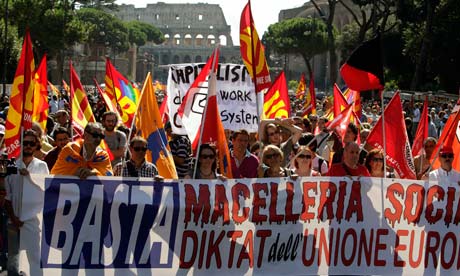By FXEmpire.com
Austerity Measures or Just Good Government – Italy’s Labor Reforms
Italian Prime Minister Monti’s labor reform, finally approved by Italy’s cabinet after weeks of bitter talks, has been hailed as a key measure in galvanizing Italy, but some economic observers remain unconvinced.
Monti insisted it was crucial to boosting stagnant economic expansion; some analysts have played down its significance.
“Rather than being revolutionary, this reform seems above all to be a public image operation aimed at foreign investors,” Maurizio Del Conte, a labor rights expert at Milan’s Bocconi university. “The pension reform, which passed almost unnoticed, was much more incisive,” he said. “The labor one, on the other hand, does not address the issue of imbalances between workers’ rights and the need for companies to be flexible.”
Economist Tito Boeri also expressed reservations. “The reform doesn’t resolve the problem of the dual nature of the labor market, where workers either have solid, protected permanent contracts or have one of the many precarious contracts,” he said.
It’s not a perfect reform, but it goes in the right direction. It aligns the Italian system of rights in the workplace with those of our main European partners. The heated debate between the government and unions has focused mainly on article 18 of the labor code.
Prime Minister Monti wants to change it to make it easier for companies to cut jobs for economic reasons, despite objections it will raise unemployment.
 The union called a strike in protest, but financial analysts are weary of the argument that the country’s growth plans are hardly affected by article 18, which is evoked in just 0.5 per cent of dismissal cases. This issue has been hotly debated throughout Europe as labor laws have been change and revised.
The union called a strike in protest, but financial analysts are weary of the argument that the country’s growth plans are hardly affected by article 18, which is evoked in just 0.5 per cent of dismissal cases. This issue has been hotly debated throughout Europe as labor laws have been change and revised.
The country’s economic growth is not linked to this article. The government wanted to tackle exploitation and precarious jobs, but it will be difficult to apply the measures to our system. “There are a myriad of small and medium enterprises, which are impossible to control and black market labor is widespread,” he added.
Article 18 has taken on a symbolic value, and it would have been wiser not to bring political and ideological issues into the crisis. After the economic troubles sweeping the eurozone hit Italy, Italians were forced to accept three austerity packages in quick succession. The country slid into a recession and experts have forecast little to no growth this year.
The government refused to contemplate a step backwards on the package and it will go to parliament after ministers have fine-tuned the details.
Prime Minister Monti, was an excellent choice, as he knows how to play the politicking game and appease the ask masters in Brussels’ as Italy will eventually need their assistance. Monti is setting the stage.
Originally posted here



